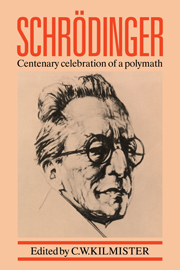Book contents
- Frontmatter
- Contents
- List of contributors
- Preface
- 1 Introduction
- 2 Boltzmann's influence on Schrödinger
- 3 Schrödinger's original interpretation of the Schrödinger equation: a rescue attempt
- 4 Are there quantum jumps?
- 5 Square root of minus one, complex phases and Erwin Schrödinger
- 6 Consequences of the Schrödinger equation for atomic and molecular physics
- 7 Molecular dynamics: from H+H2 to biomolecules
- 8 Orbital presentation of chemical reactions
- 9 Quantum chemistry
- 10 Eamon de Valera, Erwin Schrödinger and the Dublin Institute
- 11 Do bosons condense?
- 12 Schrödinger's nonlinear optics
- 13 Schrödinger's unified field theory seen 40 years later
- 14 The Schrödinger equation of the Universe
- 15 Overview of particle physics
- 16 Gauge fields, topological defects and cosmology
- 17 Quantum theory and astronomy
- 18 Schrödinger's contributions to chemistry and biology
- 19 Erwin Schrödinger's What is Life? and molecular biology
- Index
15 - Overview of particle physics
Published online by Cambridge University Press: 19 January 2010
- Frontmatter
- Contents
- List of contributors
- Preface
- 1 Introduction
- 2 Boltzmann's influence on Schrödinger
- 3 Schrödinger's original interpretation of the Schrödinger equation: a rescue attempt
- 4 Are there quantum jumps?
- 5 Square root of minus one, complex phases and Erwin Schrödinger
- 6 Consequences of the Schrödinger equation for atomic and molecular physics
- 7 Molecular dynamics: from H+H2 to biomolecules
- 8 Orbital presentation of chemical reactions
- 9 Quantum chemistry
- 10 Eamon de Valera, Erwin Schrödinger and the Dublin Institute
- 11 Do bosons condense?
- 12 Schrödinger's nonlinear optics
- 13 Schrödinger's unified field theory seen 40 years later
- 14 The Schrödinger equation of the Universe
- 15 Overview of particle physics
- 16 Gauge fields, topological defects and cosmology
- 17 Quantum theory and astronomy
- 18 Schrödinger's contributions to chemistry and biology
- 19 Erwin Schrödinger's What is Life? and molecular biology
- Index
Summary
Introduction
Erwin Schrödinger and those in his scientific generation – men like Werner Heisenberg and P. A. M. Dirac – were interested in physics because it provides us with the basic understanding of the laws of nature. Thus, even though their work has provided us with the basis of most of modern high technology, particularly through the emergence of the quantum theory of the solid state, their pursuit of physics was not motivated by this. In this sense we, in our generation, look upon Erwin Schrödinger's situation and that of his colleagues with a degree of envy.
In keeping with the tradition of Erwin Schrödinger, I have pleasure in presenting this overview of particle physics as in early 1986. I am sure this overview will be outdated by the time it sees print – but that is the fate of anything one may write in so fast moving a subject.
Physics is an incredibly rich discipline: it not only provides us with the basic understnading of the laws of nature, it is also the basis of most of modern high technology. This remark is relevant to our developing countries. A fine example of this synthesis of a basic understanding of nature with high technology is provided by liquid-crystal physics which was worked out at Bangalore by Prof. S. Chandrasekhar and his group. In this context, one may note that, because of this connection with high technology and materials’ exploitation, physics is the ‘science of wealth creation’ par excellence.
- Type
- Chapter
- Information
- SchrödingerCentenary Celebration of a Polymath, pp. 180 - 200Publisher: Cambridge University PressPrint publication year: 1987

